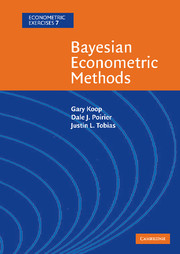Book contents
- Frontmatter
- Contents
- List of exercises
- Preface to the series
- Preface
- 1 The subjective interpretation of probability
- 2 Bayesian inference
- 3 Point estimation
- 4 Frequentist properties of Bayesian estimators
- 5 Interval estimation
- 6 Hypothesis testing
- 7 Prediction
- 8 Choice of prior
- 9 Asymptotic Bayes
- 10 The linear regression model
- 11 Basics of Bayesian computation
- 12 Hierarchical models
- 13 The linear regression model with general covariance matrix
- 14 Latent variable models
- 15 Mixture models
- 16 Bayesian model averaging and selection
- 17 Some stationary time series models
- 18 Some nonstationary time series models
- Appendix
- Bibliography
- Index
8 - Choice of prior
Published online by Cambridge University Press: 05 June 2012
- Frontmatter
- Contents
- List of exercises
- Preface to the series
- Preface
- 1 The subjective interpretation of probability
- 2 Bayesian inference
- 3 Point estimation
- 4 Frequentist properties of Bayesian estimators
- 5 Interval estimation
- 6 Hypothesis testing
- 7 Prediction
- 8 Choice of prior
- 9 Asymptotic Bayes
- 10 The linear regression model
- 11 Basics of Bayesian computation
- 12 Hierarchical models
- 13 The linear regression model with general covariance matrix
- 14 Latent variable models
- 15 Mixture models
- 16 Bayesian model averaging and selection
- 17 Some stationary time series models
- 18 Some nonstationary time series models
- Appendix
- Bibliography
- Index
Summary
Most researchers find the logic of Bayesian analysis compelling, once a prior has been specified. The stage of the process where most frequentists can be found circling the wagons is when the prior is chosen.
The pure subjectivist engaged in personal research needs only to elicit the prior that reflects his or her subjective prior beliefs. Usually the likelihood is parameterized to facilitate thinking in terms of θ, and so subject matter considerations should suggest plausible values of θ. Elicitation techniques are nicely surveyed by Garthwaite, Kadane, and O'Hagan (2005). These techniques tend to advocate thinking in terms of beliefs concerning future observables and backing out the implied beliefs regarding the hyperparameters of a conjugate prior for the unobserved parameters. Unlike most researchers, economists seem equally adept at thinking in terms of observables or unobservable parameters. Perhaps this is because the econometrician is both the statistician and the substantive field expert.
But why should prior beliefs conform to the conjugate prior form? One reason is that natural conjugate priors have an interpretation in terms of a prior fictitious sample from the same process that gives rise to the likelihood function. This corresponds to organizing prior beliefs by viewing the observable world through the same parametric window used for viewing the data.
Public research, however, inevitably requires prior sensitivity analysis and the elicitation of a family of priors likely to interest a wide range of readers.
Information
- Type
- Chapter
- Information
- Bayesian Econometric Methods , pp. 79 - 90Publisher: Cambridge University PressPrint publication year: 2007
